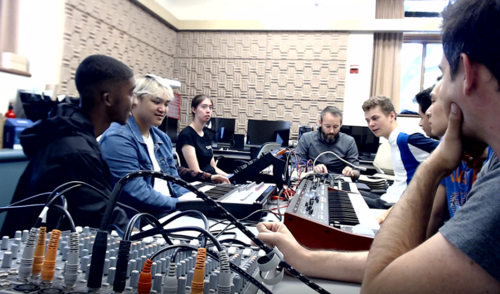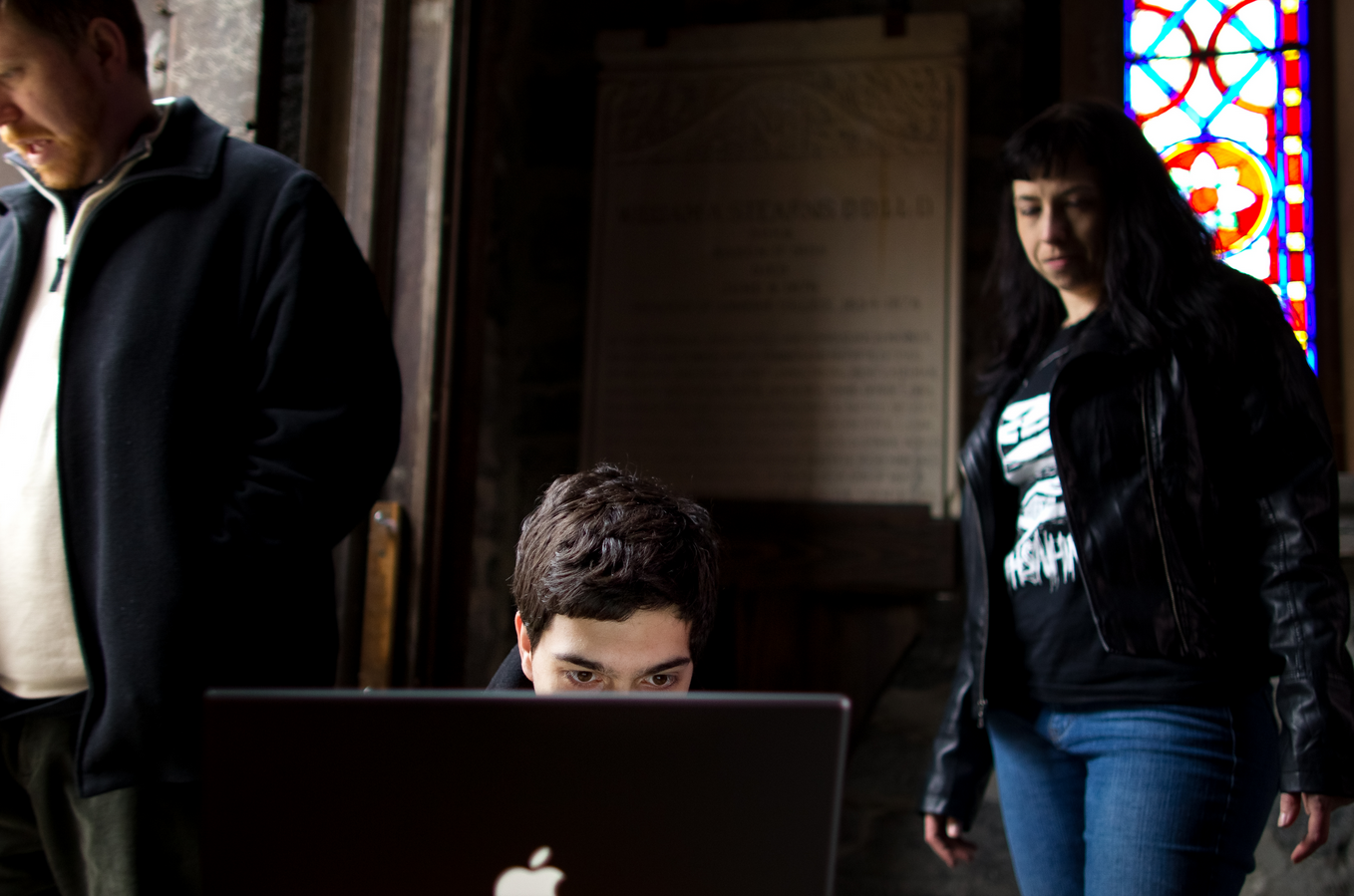Research(lab)
See current projects on the lab website
Research(publications)
Also find this list on on dblp.
Towards the Usability of Reactive Synthesis: Building Blocks of Temporal Logic
Raven Rothkopf, Angel Leyi Cui, Hannah Tongxin Zeng, Arya Sinha, Mark Santolucito
PLATEAU 2023
Can Reactive Synthesis and Syntax-Guided Synthesis Be Friends?
Wonhyuk Choi, Ruzica Piskac, Bernd Finkbeiner, Mark Santolucito
PLDI 2022
Learning CI Configuration Correctness for Early Build Feedback
Mark Santolucito, Jialu Zhang, Ennan Zhai, Jürgen Cito and Ruzica Piskac
SANER 2022
TSL Synthesis Synthesizer: Reconfigurable Signal Flows through Program Synthesis
Michel Vazirani, Wonhyuk Choi, and Mark Santolucito
NIME 2021
Demo: Synthesis-Enabled Live Coding on the Web
Kat Pompermayer, Catherine Ji, Hannah Macias, Mark Santolucito
PLIE 2021
Program Synthesis for Musicians: A Usability Testbed for Temporal Logic Specifications
Wonhyuk Choi, Michel Vazirani, Mark Santolucito
APLAS 2021
Human-in-the-loop Program Synthesis for Live Coding
Mark Santolucito
FARM 2021
cardComposer: A Functional Programming Card Game
Maria Hwang, Mark Santolucito
ITiCSE 2021
Analyzing Infrastructure as Code to Prevent Intra-update Sniping Vulnerabilities
Julien Lepiller, Ruzica Piskac, Martin Schaef, Mark Santolucito
TACAS 2021
Towards checkpoint placement for dynamic memory allocation in intermittent computing
Nicolas Shoemaker, Ruzica Piskac, Mark Santolucito
TAPAS 2020
Software Engineering for Infrastructure and Configuration (SEConfig) - Workshop Report.
Jürgen Cito, Mark Santolucito
ACM SIGSOFT Software Engineering Notes 2020
Grammar Filtering for Syntax Guided Synthesis
Kairo Morton, William Hallahan, Elven Shum, Ruzica Piskac, Mark Santolucito
AAAI 2020 (Oral Presentation)
Formal Methods and Computing Identity-based Mentorship for Early Stage Researchers
Mark Santolucito, Ruzica Piskac
SIGCSE 2020
Synthesizing Functional Reactive Programs
Bernd Finkbeiner, Felix Klein, Ruzica Piskac, Mark Santolucito
Haskell 2019
Studio Report: Yale Open Music Initiative
Scott Petersen, Mark Santolucito, Konrad Kaczmarek
ICMC 2019
Temporal Stream Logic - Synthesis Beyond the Bools
Bernd Finkbeiner, Felix Klein, Ruzica Piskac, Mark Santolucito
CAV 2019
Live Programming By Example
Mark Santolucito, William Hallahan, Ruzica Piskac
CHI 2019 Extended Abstract
Programming by Example: Efficient, but Not "Helpful"
Mark Santolucito, Drew Goldman, Allyson Weseley, Ruzica Piskac
PLATEAU 2018
Programming-by-Example for Audio: Synthesizing Digital Signal Processing Programs
Mark Santolucito, Kate Rogers, Aedan Lombardo, Ruzica Piskac
FARM 2018
Synthesizing Configuration File Specifications with Association Rule Learning
Mark Santolucito, Ennan Zhai, Rahul Dhodapkar, Aaron Shim, Ruzica Piskac
OOPSLA 2017
Version space learning for verification on temporal differentials
Mark Santolucito
ISSTA 2017
Vehicle Platooning Simulations with Functional Reactive Programming
Bernd Finkbeiner, Felix Klein, Ruzica Piskac, Mark Santolucito
SCAV 2017
Probabilistic Automated Language Learning for Configuration Files
Mark Santolucito, Ennan Zhai, Ruzica Piskac
CAV 2016
Real-Time Interactive Music in Haskell
Paul Hudak, Donya Quick, Mark Santolucito, Dan Winograd-Cort
FARM 2015
Media Modules: Intermedia Systems in a Pure Functional Paradigm
Mark Santolucito, Donya Quick, Paul Hudak
ICMC 2015
Communalizing the Interfaces of Single Player Games - (Extended Abstract)
Mark Santolucito, Maria Hwang
DiGRA 2014
Raid the fridge!: Promoting Healthy Eating Habits Through the Game Monster Appetite (Poster) (Best of
Show)
Maria Hwang, Pantiphar Chantes, Mark Santolucito
GLS 2014
SimQuabbin Project: Game-based Environmental Science Education in a Virtual World - (Poster)
J. Scott Payne, Mark Santolucito
GLS 2013
Designing a Community to Support Long-term Interest in Programming for Middle School Children
Kyle J. Harms, Jordana H. Kerr, Mark Santolucito, Terian Koscik, Michelle Ichinco, Alexis Chuck, Mary
Chou, Caitlin L. Kelleher
IDC 2012
Research(art)
Zoom Synth Jams
With the COVID-19 pandemic, the collaborative nature of music making is a sorely needed therapy. Through Zoom we can collaboratively perform, but high-latency makes this challenging with traditional approaches. Solutions exist to minimize this latency, but if we are stuck with Zoom, how can we perform around and with the latency?
Analog Synth Jams
With the Yale Open Music Initiative (OMI), we have hosted a number of analog synthesizer jam sessions. You can listen to recordings of these synth jams on the OMI homepage.

Wakoudonohiroba
The Yale Open Music Initiative now hosts a regualr end-of-semester concert. For the kickoff concert in Fall of 2018, I composed a live coding piece, Wakoudonohiroba. From the concert notes - "Wakoudonohiroba extends the calculated interface of live coding with a more visceral experience of hand signs and motions. Live coding is used to control the high level narrative and arch of the piece, while the artist uses motion tracking technology to control fine grained details of the sound synthesis."
Instamirror
Instamirror was a interactive art installation presented at the GLS 9.0 art show at University of Madison, Wisconsin. Read a summary of the work or the full proceedings of the conference.
Isosteeple
Isosteeple was a sound art installation funded by the Amherst College Copeland Colloquium "Art in Place and the Place of Art". The installation was centered around interaction audio sampling by use of motion detection. Read a review.

MTM
MTM combines dance with custom motion tracking software to trigger various collections of samples. This early exploration of simple motion tracking tells a story through audio and physical interaction with an unseen (aural) environment.